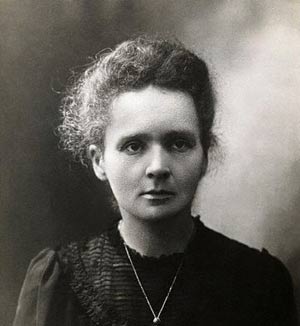Marie Curie was a Polish scientist who won a Nobel prize in both Chemistry and Physics. She was the first female professor of the University of Paris, and made ground-breaking work in the field of Radioactivity.
“Humanity needs practical men, who get the most out of their work, and, without forgetting the general good, safeguard their own interests. But humanity also needs dreamers, for whom the disinterested development of an enterprise is so captivating that it becomes impossible for them to devote their care to their own material profit.”
- Marie Curie
Short Bio Marie Curie
Marya Sklodovska was the youngest of 5 children, born in 1867, Warsaw Poland. She was brought up in a poor but well educated family. Marya excelled in her studies and won many prizes. At an early age she became committed to the ideal of Polish independence from Russia which was currently ruling Poland with an iron fist, and in particular making life difficult for intellectuals. She yearned to be able to teach fellow Polish woman who were mostly condemned to zero education.
 Unusually for women at that time, Marya took an interest in Chemistry and Biology. Since opportunities in Poland for further study was limited, Marya went to Paris, where after working as a governess she was able to study at the Sorbonne, Paris. Struggling to learn in French, Marya threw herself into her studies, leading an ascetic life dedicated to studying. She went on to get a degree in Physics finish top in her school. She later got a degree in Maths, finishing second in her school year.
Unusually for women at that time, Marya took an interest in Chemistry and Biology. Since opportunities in Poland for further study was limited, Marya went to Paris, where after working as a governess she was able to study at the Sorbonne, Paris. Struggling to learn in French, Marya threw herself into her studies, leading an ascetic life dedicated to studying. She went on to get a degree in Physics finish top in her school. She later got a degree in Maths, finishing second in her school year.
It was in Paris, that she met Pierre Curie, who was then chief of the laboratory at the school of Physics and Chemistry. He was a renowned Chemist, who had conducted many experiments on crystals and electronics. Pierre was smitten with the young Marya and asked her to marry him. The unromantic Marya initially refused, but, after persistence from Pierre she relented. The two would later become inseparable, until Pierre’s untimely death.
Marie Curie work on Radioactivity
Marie pursued studies in radioactivity. In 1898, this led to the discovery of two new elements. One of which she named polonium after her home country.
There then followed 4 years of extensive study into the properties of radium. Using dumped uranium tailings from a nearby mine, they were very slowly, and painstakingly, able to extract a decigram of radium.
Radium was discovered to have remarkable impacts. Marie actually suffered burns from the rays. It was from this discovery of radium and its properties that the science of radiation was able to develop. Using the properties of radium to burn away diseased cells in the body. Initially radiotherapy was called ‘currietherapy’
The Curries agreed to give away their secret freely; they did not wish to patent such a valuable element. The element was soon in high demand and it began industrial scale production.
For their discovery they were awarded the Davy Medal (Britain) and the Nobel Prize for physics in 1903.
In 1905, Pierre was killed in a road accident, leaving Marie to look after the laboratory and her 2 children.
In 1911 she was awarded a second Nobel prize in Chemistry for the discovery of actinium and further studies on radium and polonium.
The success of Marie Curie also brought considerable hostility, criticism and suspicion from a male dominated science world. She suffered from the malicious rumours and accusations that flew around.
The onset of World War I in 1914, led to Marie Curie dedicating her time to the installation of X ray machines in hospitals. Marie understood that x ray machines would easily be able to located shrapnel, enabling better treatment for soldiers. By, the end of the first world war, over a million soldiers had been examined by her X ray units.
At the end of the First World War she returned to the Institute of Radium in Paris, and also took great pride in serving the fledgling League of Nations. She also published a book – radioactivity which encompassed her great ideas on science.
Marie Curie died in 1934 from Cancer. It was an unfortunate side effect of her own ground-breaking studies into radiation which were to help so many people.
Marie Curie pushed back many frontiers in science; and at the same time set a new bar for female academic and scientific achievement.
No comments:
Post a Comment